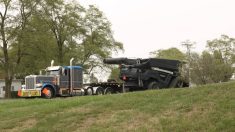Bayer CropScience has cracked canola’s genetic code, which means growers will get their hands on new varieties faster.
“It will allow us to accelerate all of our trait development,” said Stewart Brandt, Bayer’s manager for canola breeding operations in North America.
The German crop science company announced Oct. 9 that it had sequenced the canola genome and its constituent genomes, giving it a unique insight into the plant and its relatives.
The project was a collaborative effort with institutes in China, the Netherlands and Australia. Bayer funded the project, assembled the data and will keep the information under wraps for its own research and breeding efforts.
Read Also

Fendt takes a combine on the road in the U.S.
Putting an Ideal combine in fields across different regions has given the brand a chance to prove that the combine is capable of performing well in a variety of conditions.
“This really shows the level of innovation Bayer is willing to make in order to bring this type of innovation to a crop that isn’t in the big three,” Brandt said.
Hieronim Polewicz, Bayer’s global breeding and trait development manager, said it previously would have taken months of laboratory work to find beneficial traits in related species. That task can now be done using computer software in a matter of days.
“This is amazing technology,” he said.
Brandt said the sequenced genome is a tool that will help the company’s researchers and breeders conduct reverse genetics and backcrossing faster and more precisely than they could before.
For instance, it has always been tricky to introduce beneficial new traits into the company’s InVigor hybrids without dragging along undesirable traits that must then be weeded out.
Having a genetic map of canola and its constituent genomes, brassica rapa and brassica oleracea, will allow researchers to quickly identify beneficial traits in related species and determine whether the resulting hybrids contain the desired traits and none of the garbage.
“It should speed things up a lot,” Brandt said.
It will also be valuable technology for creating varieties containing stacked genes. Starting next year, Bayer will conduct registration trials on
clubroot tolerant and sclerotinia tolerant InVigor hybrids.
“One of the things this will allow us to do is to put those traits together into InVigor hybrids quickly instead of them being single traits in single hybrids,” he said.
Those traits will in turn be stacked with other traits in the pipeline such as blackleg and pod shatter tolerance.
Bayer also anticipates unexpected benefits from the sequencing tool. Its power is largely unknown because the company’s researchers and breeders haven’t had a chance to work with it.
“It very well could allow us to change the crop and increase its value from different parameters that we aren’t anticipating yet,” Brandt said.
Soybeans, corn, rice and sorghum have also been sequenced.















